C.S. Lewis was born in Belfast, Northern Ireland, in 1898. He taught English literature at Oxford and later Cambridge University, and was a prolific writer, lay theologian, and literary critic. He wrote such beloved classics as the Chronicles of Narnia, Mere Christianity, The Great Divorce, The Screwtape Letters, and many others. Not only did Lewis leave a great literary legacy, but so did his friend J.R.R. Tolkien and other friends in their writing group, the Inklings.
Given their popularity, it’s not surprising some very brilliant movies have been made about the Lewis and the other Inklings. These movies capture their struggles, loss, friendships, joys, literary achievements, and love for Christ and people.
Here is a list of ten movies worth watching.
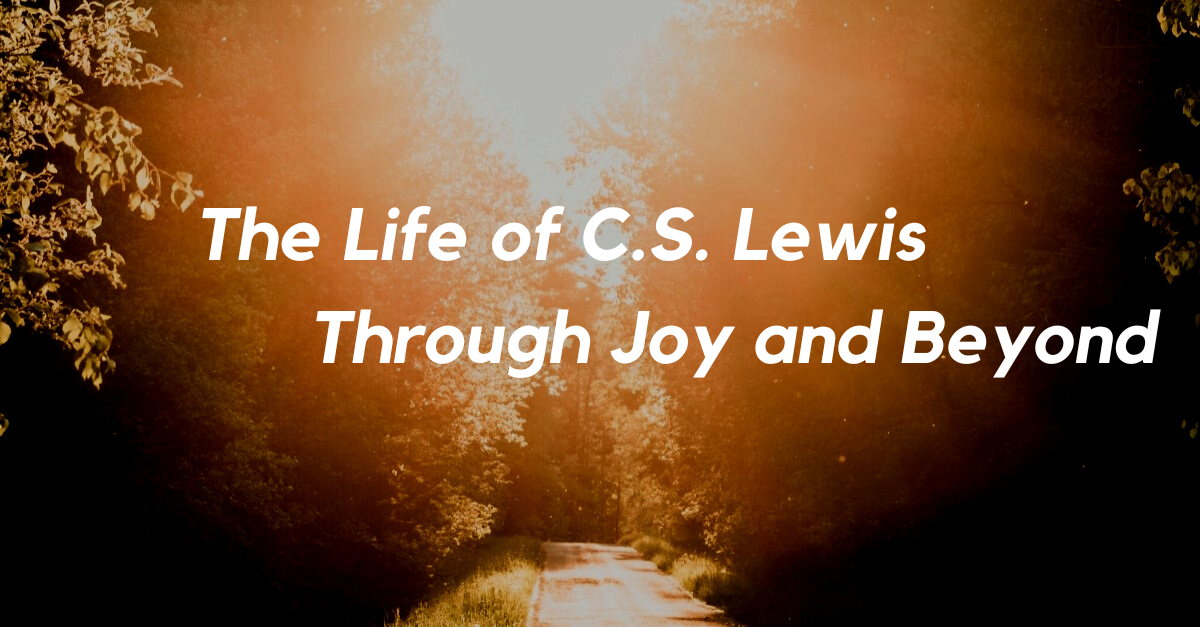 Photo Credit: Graphic by G. Connor Salter, background photo by Julian Hoghgesang/Unsplash
Photo Credit: Graphic by G. Connor Salter, background photo by Julian Hoghgesang/Unsplash
1. Through Joy and Beyond: The Life of C. S. Lewis
Rating: Unrated
This interesting documentary was the first one produced about Lewis. It was released in 1979 and is hosted by Lewis’s secretary, Walter Hooper. It opens in the beautiful countryside of County Down, Northern Ireland, where Lewis grew up. The movie explores key biographical events, including his Irish upbringing, friendship with artist Arthur Greeves, and WWI trauma. It also shows the transcendent joy Lewis experienced while reading classic mythology, great literature, and nature, leading him from a ferocious atheism to a devout Christian faith.
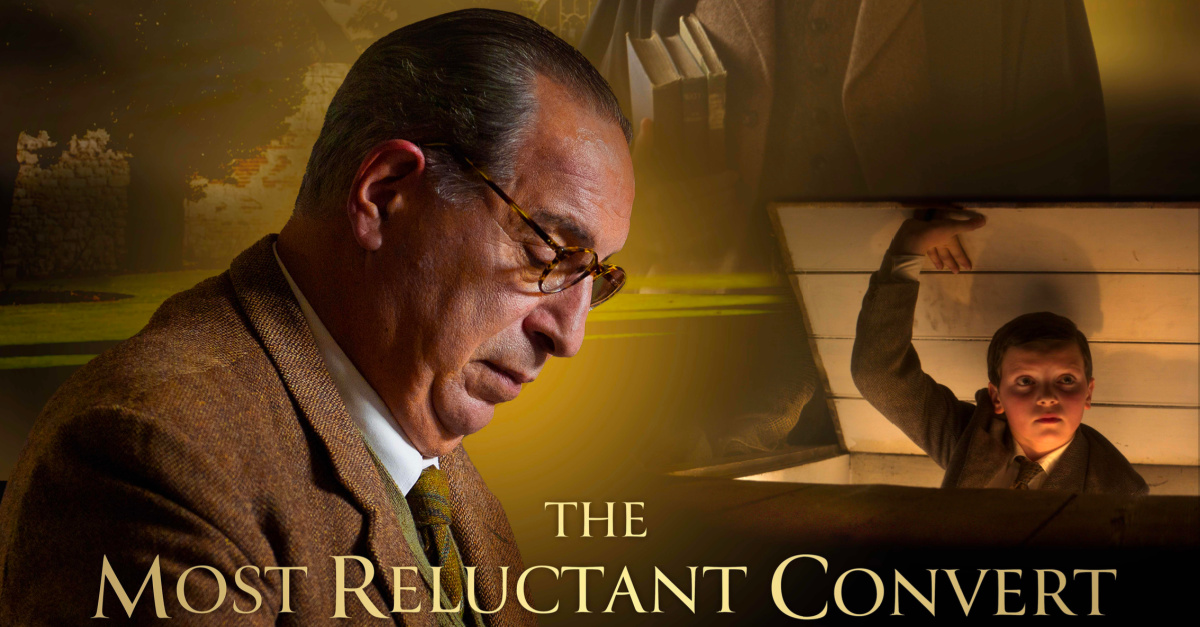 Photo Credit: ©A1 Productions
Photo Credit: ©A1 Productions
2. The Most Reluctant Convert
This is the most recent movie exploring C . S. Lewis’s journey from atheism, theism, and to Christianity. Directed by Norman Stone, the script is based on “The Most Reluctant Convert.” The play, produced by the Fellowship of Performing Arts, stars Max McLean as Lewis and has been incredibly successful. Seeing the play in Asheville, North Carolina, was a moving experience.
The script is based on Lewis’s books Surprised by Joy, The Weight of Glory, and his collected letters. McClean plays the older Lewis and narrates events as the movie dramatizes Lewis’s conversion story. The most poignant scene arrives when Lewis is on Addison’s walk conversing with Tolkien and Hugo Dyson, and he finally understands that Christianity is the “true myth.”
Stone did a brilliant job casting Nicholas Ralph as the younger Lewis and McClean as the older Lewis. McClean’s imitation of Lewis’s mixed Northern Irish and English accent, and his ability to make Lewis personable, is very well done. The supporting cast—particularly the actors playing Tolkien, Lewis’ father and mother, his mentor William Kirkpatrick, and his brother Warnie—are spot-on.
The movie is not recommended for small children. It includes a scene portraying Lewis’s first struggles with lust when he fancies a school teacher (and the older Lewis calling this experience an intense shock). Several scenes show Lewis’ intense WWI experiences, which help explain his struggle with the existential reality of suffering and evil. After converting to Christianity, he understood that evil is a mystery that cannot be rationalized. The powers of darkness and evil have been defeated through Christ’s incarnation, death, and resurrection.
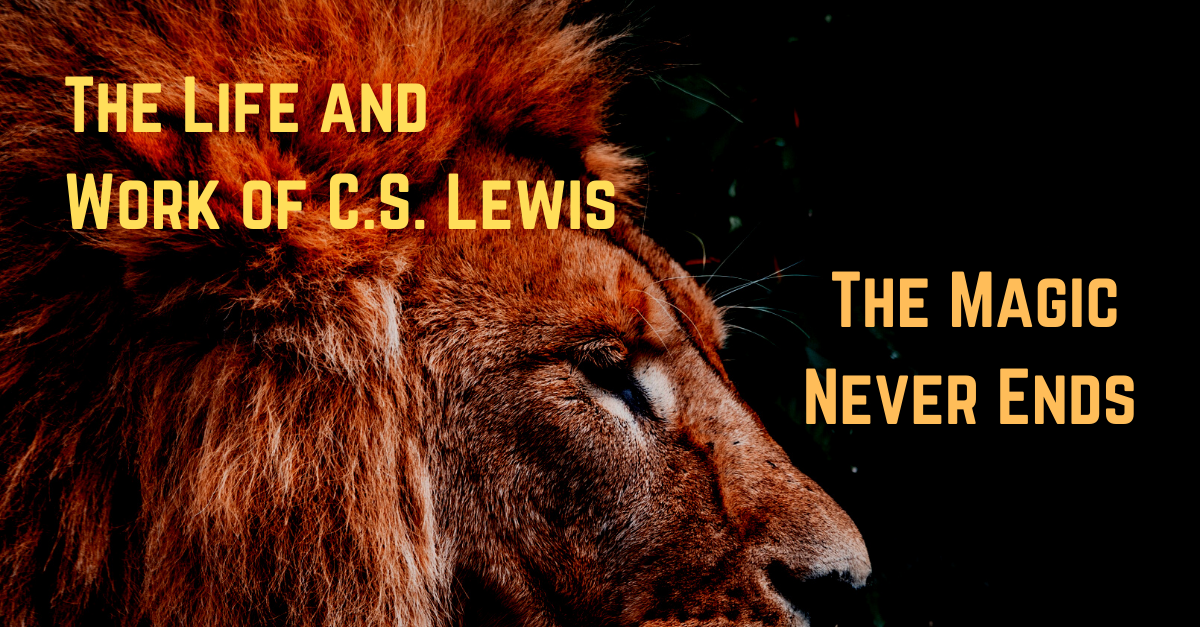 Photo Credit: Graphic by G. Connor Salter, background photo by Mike van den Bos/Unsplash
Photo Credit: Graphic by G. Connor Salter, background photo by Mike van den Bos/Unsplash
3) The Magic Never Ends: The Life and Work of C. S. Lewis
This documentary is directed by Chip Duncan and narrated by Ben Kingsley, and based on the 2001 book The Magic Never Ends by John Ryan Duncan. Interviews include Hooper and Lewis’s stepson Douglas Gresham, giving a personal look at Lewis’ Belfast youth, how Celtic mythology and George MacDonald impacted his writing, and how much his life drastically changed after he came to know Christ in 1931. Actress Debora Winger, who played Joy Davidman in Shadowlands, discusses her role playing the woman who captured Lewis’s heart. Scottish literary critic Colin Manlove delves into the way Lewis brought together reason and imagination so brilliantly in his books.
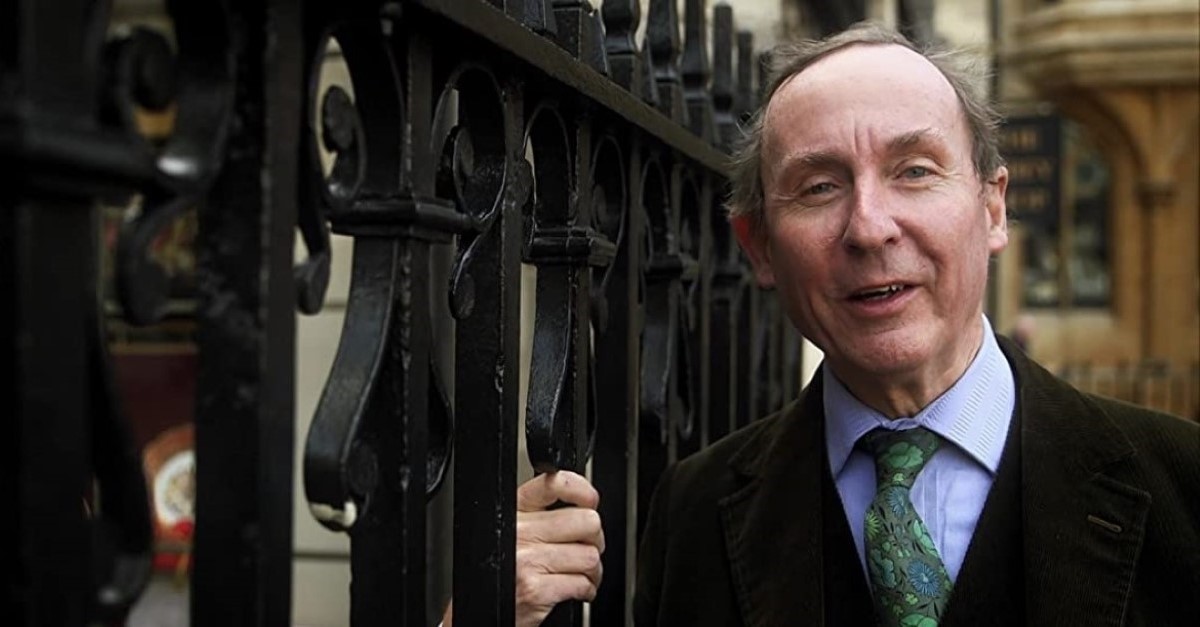 Photo Credit: Amazon/BBC
Photo Credit: Amazon/BBC
4. Narnia’s Lost Poet: The Secret Lives and Loves of C. S. Lewis
This movie, hosted by A.N. Wilson, explores the importance of Lewis’s Irish heritage, writing, and the profound losses and great love he experienced. In its opening, the movie highlights an overlooked part of Lewis’ writing life: Westminster Abbey on the day Lewis was honored at Poet’s Corner. Lewis had a burning ambition to be a great poet early in his life. He never achieved great success as a poet and lost interest in becoming famous for his verses after becoming a Christian. When Lewis came to know the Great Poet, he found something different to say as a writer. He spent most of his life writing lucid, moving prose evoking Christ’s beauty and agape love. To his surprise, his writings about Christianity sometimes attracted controversy.
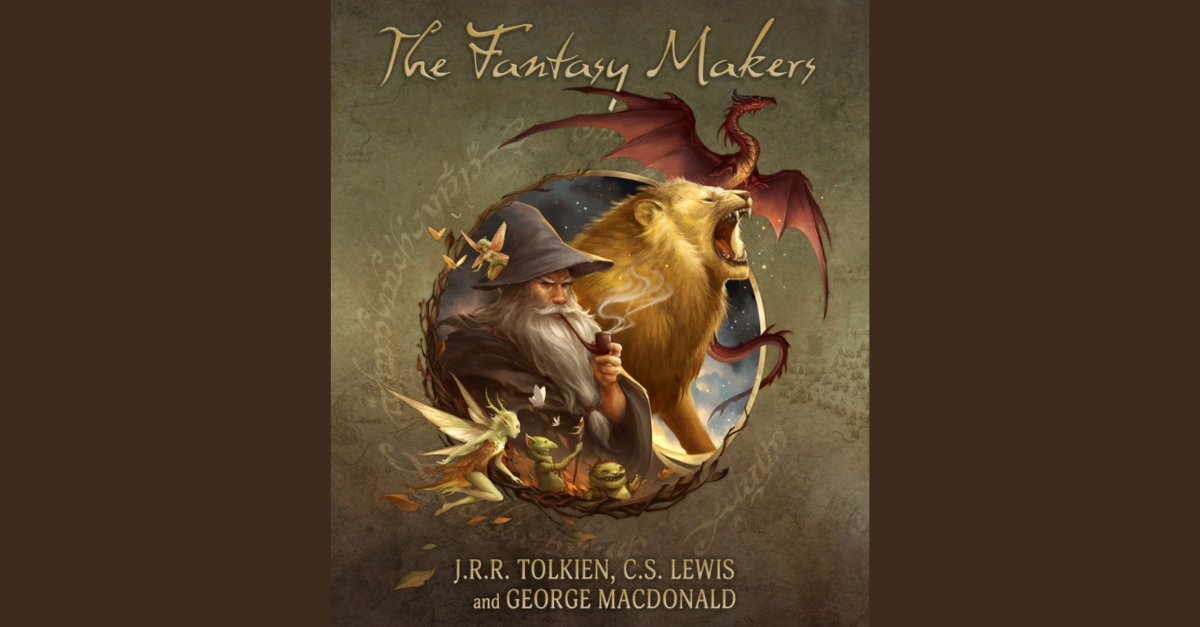 Photo Credit: Refuge 31 Films
Photo Credit: Refuge 31 Films
5. The Fantasy Makers
This fascinating documentary captures the enduring legacy of Lewis, MacDonald and Tolkien. It opens at the Wade Center at Wheaton College, Illinois, highlighting the center’s work dedicated to the Inklings and writers inspired by them. Interviews include Malcolm Guite, Kirsten Jefferey Johnson, Michael Ward, Rowan Williams, and Alister McGrath discussing the great pioneers of modern fantasy literature. Lewis, Tolkien, and MacDonald each believed that while ancient myths don’t show what gods to worship, their stories capture important truths about wonder and faith. They combined reason, faith, and imagination in their works, inspired by mythological ideas. They understood well that God is the source of all beauty and art. Their literary legacies are shining examples of that.
Each segment about MacDonald, Tolkien, and Lewis features dramatized scenes where actors bring them to life. Other scenes include striking footage of locations in England and Scotland that mattered to these writers.
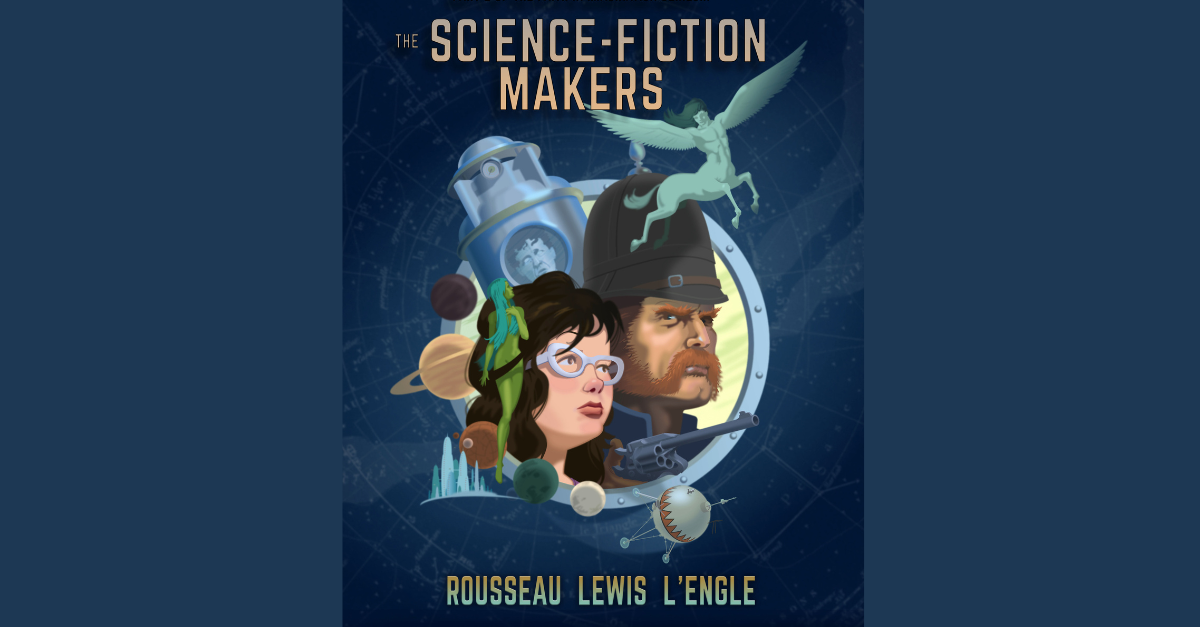 Photo Credit: Refuge 31 Films
Photo Credit: Refuge 31 Films
6. The Science Fiction Makers
This interesting movie (by the same company that produced The Fantasy Makers) explores Lewis alongside other famous writers: Madeleine L’Engle and Victor Rosseau. Interviewees include Malcolm Guite, Sara Arthur, Michael Boyce, Brenton Dickieson, Diana Glyer, Derek White, and Emily Strand. They expound on how these authors’ science-fiction gave a rebuttal to the “scientism” in the works of H. G. Wells and others. Scientism is the belief that belief in the divine is a delusion and that all reality can be explained empirically.
Although Rosseau, Lewis, and L’Engle appreciated Wells’ work, they rejected his scientific materialism. They affirmed that science and faith aren’t mutually exclusive and that reason and imagination are gifts from God. In books like A Wrinkle In Time, Out of the Silent Planet, and The Messiah of the Cylinder, all three writers affirmed these ideas.
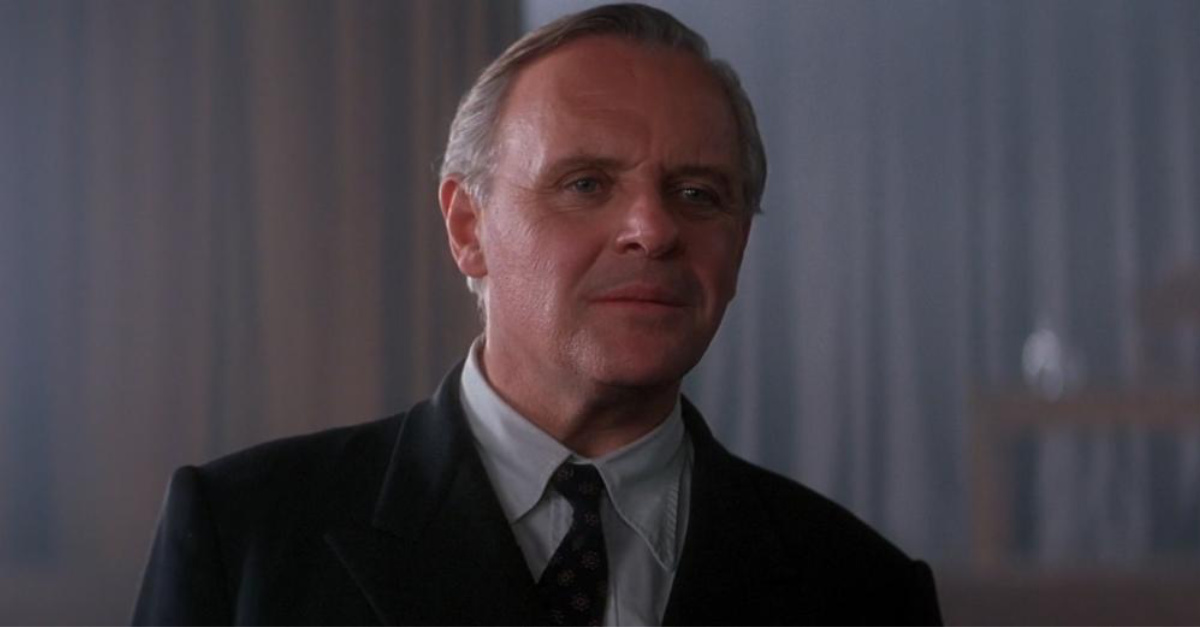 Photo Credit: ©Savoy
Photo Credit: ©Savoy
7. Shadowlands
Directed by Richard Attenborough, this movie brilliantly portrays the love between Joy Davidman and C. S. Lewis on an emotional level. Joy Davidman admired Lewis’ books, which influenced her conversion from atheism to Christianity. A letter she wrote to Lewis stood out to him because of her wit and intellect, and they quickly became friends. Joy visited Lewis in England with her two sons, David and Douglas Gresham.
Following her divorce, their friendship became love in a surprising way. Joy relocated to England, and Lewis married her in a civil union after learning her visa was going to be revoked. After Joy was diagnosed with bone cancer, Lewis married her for the second time. Anglican priest Peter Bide married them in the hospital and prayed for Joy’s healing. She went into remission for four years, the happiest years of her and Lewis’s life. Eventually, Joy’s cancer returned. Her death devastated Lewis, leading him to write A Grief Observed, published in 1961. The book has helped thousands of grieving people find healing and hope.
While iconic actor Anthony Hopkins gives a good performance, the script mispresents Lewis as an academic who doesn’t experience people much outside academia. In reality, Lewis took in evacuee children, preached to Royal Air Force officers during WWII, and counseled various people who wrote to him after discovering his books. Despite some inaccuracies, Attenborogh’s movie portrays the amazing love story effectively.
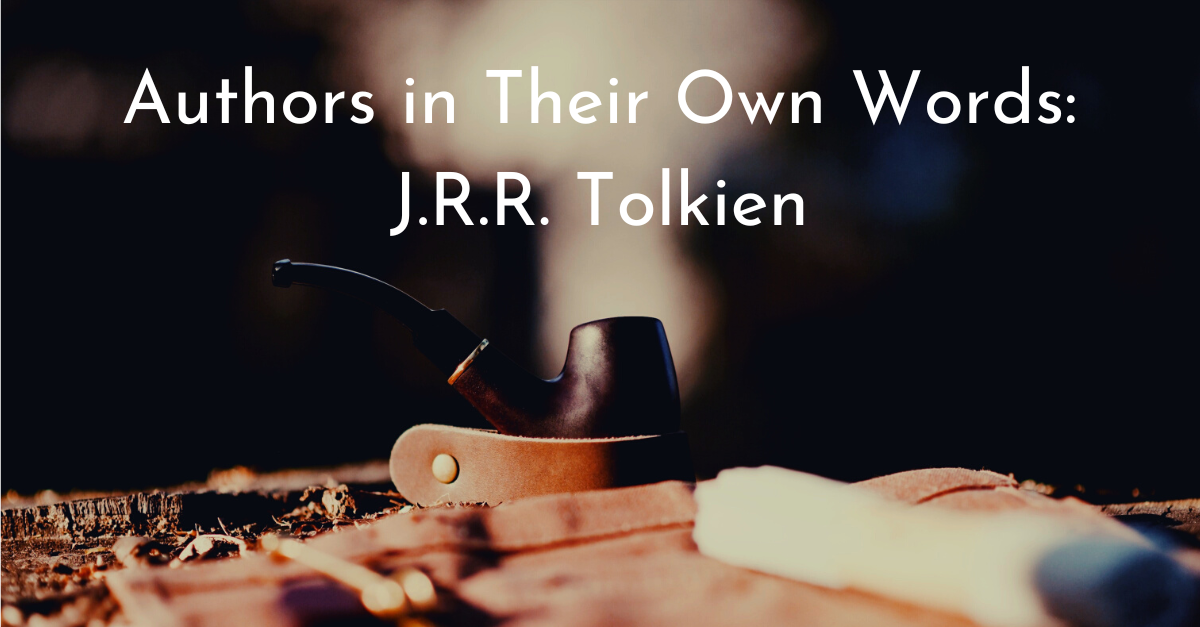 Graphic by G. Connor Salter, background photo Blake Wisz/Unsplash
Graphic by G. Connor Salter, background photo Blake Wisz/Unsplash
8. BBC Authors In Their Own Words: J.R.R. Tolkien
This 1968 documentary contains an interview with Tolkien about what inspired him to write his mythology. The documentary captures how popular The Hobbit and The Lord of the Rings became worldwide, even though they appeared slowly. The Hobbit appeared in 1937, and the last volume of The Lord of the Rings appeared in 1955. Some Oxford University students are interviewed about Tolkien’s mythology and its cultural impact. It is amazing that there is actual footage of Tolkien for his admirers. This documentary highlights Tolkien’s skill as a philologist who created languages for his works. One scene shows him reciting a saying in Elvish while he writes it out in a book.
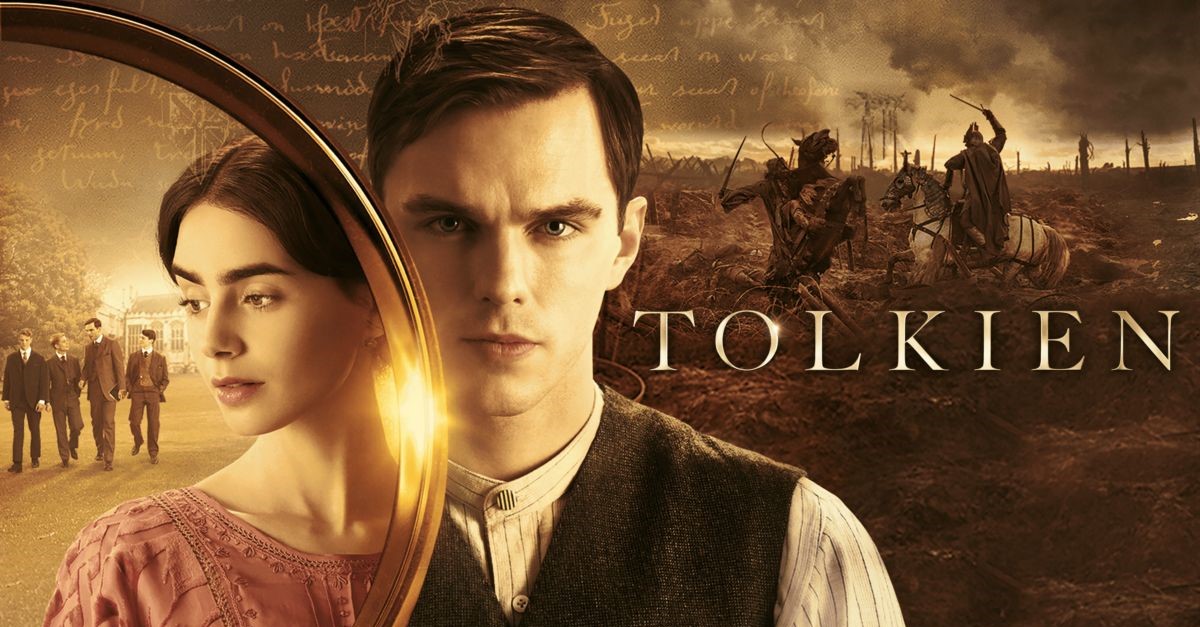 Photo Credit: Disney Plus
Photo Credit: Disney Plus
9. Tolkien
Unfortunately, this biopic directed by Finnish director Dome Karukoski doesn’t delve deeply into Tolkien’s Christian faith. However, it captures Tolkien’s friendships in a schooldays literary group, his love for his wife Edith, and how his love for language inspired him to create his Middle-earth mythology. Lily Collins brings Edith to life—a talented, lively, brilliant pianist who inspired Tolkien’s characters Luthien and Arwen. The movie is not kid-friendly—it includes graphic scenes of WWI violence. Nicholas Holt plays a very good Tolkien, and the viewer will be fascinated by the life experiences and myths that inspired his writing. Even with its flaws, Tolkien is a profoundly moving movie about friendship, literature, and art’s power.
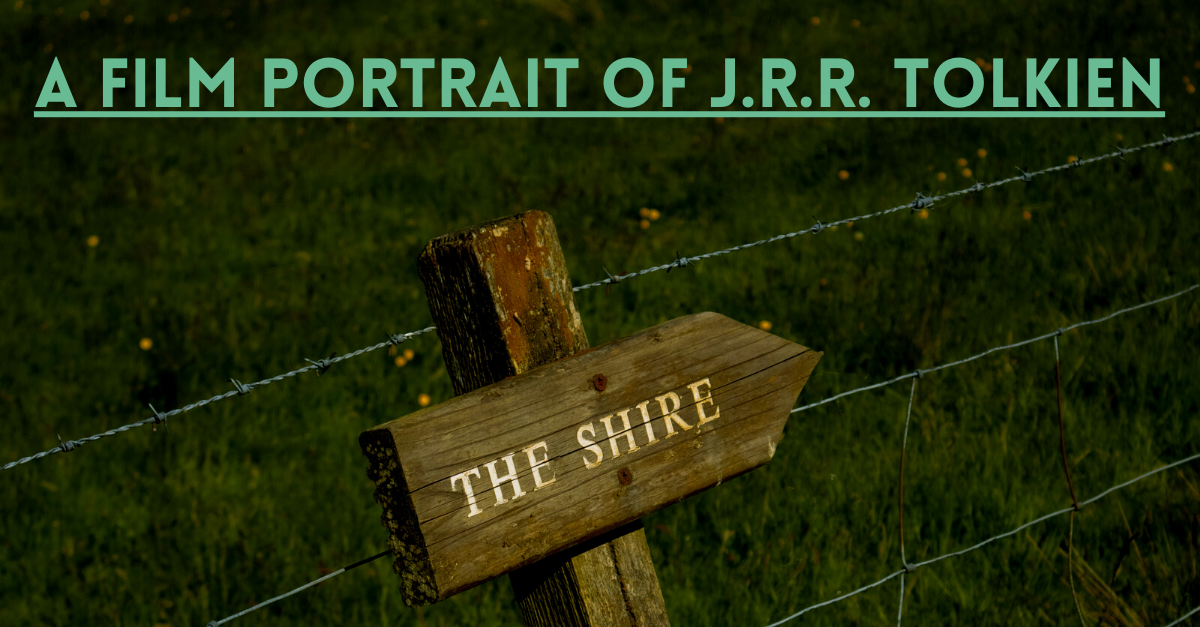 Photo Credit: Graphic by G. Connor Salter, background photo by Vishnu Prasad/Unsplash
Photo Credit: Graphic by G. Connor Salter, background photo by Vishnu Prasad/Unsplash
10. A Film Portrait of J.R.R. Tolkien
This 1996 documentary interviews Tolkien’s sons, Christopher and Michael Tolkien, and his daughter Priscilla Tolkien. These interviews give an intimate account of how his Middle-earth mythology progressed and how much he struggled to finish his work through WWII while teaching and raising a family. For example, Christopher reads from letters that he and his father wrote to each other about art’s importance, written while Christopher was serving in the Royal Air Force.
On a tragic note, Christopher conveys Tolkien’s life goal was finishing The Silmarillion. His father kept revising it but sadly never saw it published in his lifetime. Christopher completed the final revisions and published it in 1977.
If you’re looking for more movies about C.S. Lewis and the Inklings, watch out for Freud’s Last Session, which is currently being filmed. Based on the play by Mark St. Germain, the movie will star Anthony Hopkins as Sigmund Freud and Matthew Goode as C.S. Lewis, imagining a conversation where they discuss their worldviews.
Further Reading:
What Makes Owen Barfield the First and Last Inkling?
10 Things You Need to Know about the Inklings
Why Was Charles Williams the Odd Inkling?
Last of the Inklings' Thursday Night Meetings
Photo Credit: Getty Images/cerro_photography
Justin Wiggins is an author who works and lives in the primitive, majestic, beautiful mountains of North Carolina. He graduated with his Bachelor's in English Literature, with a focus on C.S. Lewis studies, from Montreat College in May 2018. His first book was Surprised by Agape, published by Grant Hudson of Clarendon House Publications. His second book, Surprised By Myth, was co-written with Grant Hudson and published in 2021. Many of his recent books (Marty & Irene, Tír na nÓg, Celtic Twilight, Celtic Song, Ragnarok, Celtic Dawn) are published by Steve Cawte of Impspired.
Wiggins has also had poems and other short pieces published by Clarendon House Publications, Sehnsucht: The C.S. Lewis Journal, and Sweetycat Press. Justin has a great zeal for life, work, community, writing, literature, art, pubs, bookstores, coffee shops, and for England, Scotland, and Ireland.